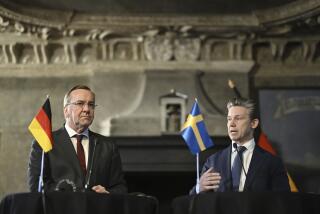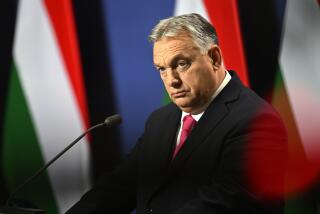CRISIS IN THE PERSIAN GULF : Hungarian Medical Team Readied for Duty in Gulf : Military: A secret Parliament session fuels speculation that Budapest also may allow use of its airspace or bases in the event of an attack on Iraq.
BUDAPEST, Hungary — Parliament announced Wednesday that a 40-man Hungarian army medical team is being readied for service in the Persian Gulf, and a five-hour secret session on “matters of national defense” fueled speculation that Hungarian airspace or bases might be used in the event of an attack on Iraq.
Hungary, which has been eager to show solidarity with Western countries in the gulf crisis, has available dozens of former Soviet military bases that could provide strategic refueling stops about halfway between Iraq and Britain, where many of NATO’s air force units are based.
Deputies rushed to Parliament Tuesday night, when the government of Prime Minister Jozsef Antall called a secret session at 6 p.m. to discuss national security and “a wide array of questions related to the gulf crisis,” said Parliament Speaker Gyorgy Szabad.
The session had been preceded by an extraordinary meeting of the Defense, Foreign Affairs and Constitutional committees of Parliament.
After the closed-door session that stretched past 11 p.m., Szabad announced only that the military medical team that had been proposed months ago had won expected parliamentary endorsement.
According to the Budapest daily newspaper Nepszabadsag, Szabad was asked by a Hungarian journalist if the government had received a request from the United Nations Security Council to allow “access to the forces against Iraq to Hungarian airspace and airports.”
The Speaker said he could make no comment on the subject and suggested that the journalist had been exposed to privileged information.
Senior government and opposition figures also would not confirm or deny whether Hungary has been approached about cooperating in the event a military strike is launched to force Iraq to withdraw from Kuwait.
“I can only say that what was discussed was a secret of state,” said lawmaker Gaspar Miklos Tamas of the opposition Alliance of Free Democrats. “In matters of national defense, we have to abide by parliamentary policy on confidentiality.”
Balazs Horvath, a Cabinet minister without portfolio who is seen as the right hand of ailing Prime Minister Antall, heightened the atmosphere of intrigue by telling reporters that the five-hour debate had produced a “result” that was likewise secret.
Hungarian President Arpad Goncz made clear during his visit to Washington in September that his nation stood ready to play a role in forcing Iraqi President Saddam Hussein to end his occupation of Kuwait.
Despite the demands of its $21-billion foreign debt and crumbling trade network, Hungary has abided by the global embargo against Iraq.
Iraq owes Hungary $145 million, and additional debts had been forgiven in return for Baghdad’s promise to ship oil to Hungary--compensation that has been cut off by the trade embargo.
Since Antall’s government took power after spring elections restored democracy to Hungary, the country has sought to reorient its economic, political and military ties to the West.
Former Foreign Minister Gyula Horn, who heads the Foreign Affairs Committee in Parliament, suggested earlier this year that Hungary be considered for membership in NATO.
Soviet troops have been moving out of dozens of military sites in Hungary, including seven air bases said to be equipped with good runways and refueling facilities.
More to Read
Sign up for Essential California
The most important California stories and recommendations in your inbox every morning.
You may occasionally receive promotional content from the Los Angeles Times.











